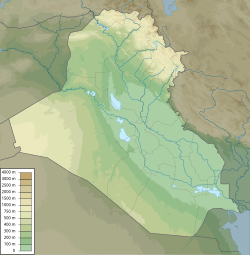Al-Basha Mosque
| Al-Basha Mosque | |
|---|---|
جامع الباشا | |
 The mosque in 2019, viewed from the sahn | |
| Religion | |
| Affiliation | Islam |
| Ecclesiastical or organisational status | Mosque |
| Status | Active |
| Location | |
| Location | Bab al-Saray, Mosul |
| Country | Iraq |
Location of the mosque in Iraq | |
 | |
| Geographic coordinates | 36°20′36″N 43°08′10″E / 36.34333°N 43.13611°E |
| Architecture | |
| Type | Mosque architecture |
| Founder | Jalili dynasty |
| Completed |
|
| Destroyed | 2014 (by ISIL) |
| Dome(s) | One (maybe more) |
The Al-Basha Mosque (Arabic: جامع الباشا, lit. 'The Pasha's Mosque'), formerly known as al-Khabazin Mosque (Arabic: جامع الخبازين, lit. 'The Bakers' Mosque'), is a mosque located in the Bab al-Saray area of Mosul, Iraq.
History
[edit]The mosque was constructed by Hussein Pasha of al-Jalili dynasty during the Ottoman imperial rule, and was later completed by his son Ghazi Muhammad Amin Pasha in 1169 AH (1755/1756 CE), and later included a madrasa. The family took care of the mosque over time; and several members of the dynasty are buried in the mosque.[1] The mosque is one of the oldest religious buildings established by al-Jalili dynasty.[2]
The mosque was among many that was destroyed by the Islamic State of Iraq and the Levant during their takeover of Mosul in 2014. After ISIS was defeated, the mosque was reconstructed by local sculptors and artists in its original form without government interference. In 2021, prayers and Eid al-Fitr celebrations reopened in the mosque.[3][4]
Gallery
[edit]-
View over the mosque during its reconstruction, 2019
-
Detail of historic structure, 2019
-
Unusual structure in the sahn
-
Inscription, 2019
-
Conical dome and inscriptions, 2019
-
Images of the historic mosque inside the reconstructed mosque, 2019
-
Inside the mosque, 2019
See also
[edit]References
[edit]- ^ Al-Jalili, Sa'ud (July 23, 2010). "Pasha Mosque and Maryam Khatun Mosque". mosul-network.org (in Arabic). Archived from the original on June 27, 2011. Retrieved July 2, 2025.
- ^ Al-Ta'ie, Raed Ibrahim (July 8, 2010). "The mosques of Bayt al-Jalili are still standing evidence of the era of old Mosul's history". mosul-network.org (in Arabic). Archived from the original on June 27, 2011. Retrieved July 2, 2025.
- ^ Wilson, Emilie (May 13, 2021). "Ramadan traditions and Mosul's revival after Daesh". Institute of Development Studies. Retrieved July 2, 2025.
- ^ Saeed, Saeed Addrass (May 13, 2021). "Ramadan traditions and Mosul's revival after Daesh". Coalition for Religious Equity and Inclusive Development. United Kingdom: University of Sussex. Retrieved July 4, 2025.
External links
[edit]![]() Media related to Pasha Mosque, Mosul at Wikimedia Commons
Media related to Pasha Mosque, Mosul at Wikimedia Commons
- Hasan, Wasan A.; Mohammad, Haitham Q. (2019). مساجـد الموصــل إبّان التدميــر والإعمــار جامـع الباشـا انموذجـاً [The Mosques of Mosul from destruction to reconstruction: Al Basha Mosque as a case study]. Al Malweah for Archaeological and Historical studies (in Arabic). Retrieved July 4, 2025 – via Mosqpedia.org.
- 18th-century mosques in Iraq
- 21st-century mosques in Iraq
- Buildings and structures demolished in 2014
- Demolished buildings and structures in Iraq
- Mosque buildings with domes in Iraq
- Mosques completed in the 1750s
- Mosques completed in the 2010s
- Mosques destroyed by ISIL
- Mosques in Mosul
- Religious buildings and structures completed in 1755








